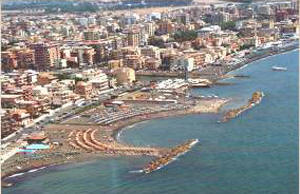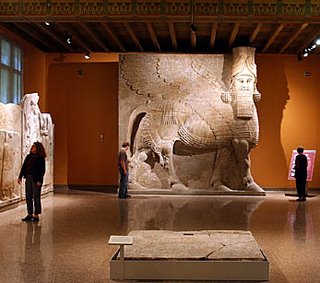This was inspired by
reading this post.
In the years leading up to 1979, the Soviet Union and the United States were negotiating the SALT II treaty, limiting the proliferation of nuclear weapons. As part of the atmosphere of detente, the Soviets allowed Russian Jews to emigrate out of the Soviet Union. However, the treaty talks fizzled, the Soviets invaded Afghanistan, Carter retaliated with a grain embargo and a boycott of the Moscow Olympics, and the stream of Russian Jews leaving dried up almost immediately. My parents were lucky that ours was literally one of the last handfuls of families to have left the USSR in the fall of 1980.

It was early November in Kiev. It was somewhat cold, but no snow. Most of our friends and family had already left the country, but a few remained to wish us farewell and escort us to the Kiev train station. I recall getting on the train - it was evening. My mother was sobbing. She kept saying to me "Look around, try to remember this place, you'll never see it again!" I was embarrassed and dismissive. How could I forget the place where I grew up. I'd lived there almost ten years. Of course she was right. The memories fade gradually, and you don't notice how all the details disappear. You are left with this phantom feeling that you still remember things well, but if you try to actually put your mind to it, you realize it is an illusion.
We were on the train headed to the city of Chop (Cop) on the Czechoslovakian border. We got there in the morning and had to find a place to stay until our paperwork could be approved by the customs officials. Although technically we should have already been approved to leave, this was a little extra bit of bureaucratic torment that the regime wanted to inflict on us.
Eventually we made it through customs and at that point we were no longer on Soviet soil. Even as a kid, I recall how weird that felt. It is almost like being let out of prison after many years. You don't know what to do with your freedom. The prison, for all its horrors, created a structure for your life and it molded your thoughts and actions in a constrained and predictable way. Anyway, we were on our way to Bratislava, Czechoslovakia.

As a ten year old kid I was pretty excited. The countryside was beautiful. In some ways it wasn't different from the Ukranian side, but it was cleaner, there were more cars, and the houses had a more gingerbread fairy-tale look to them. The towns also were more western looking - there were advertisements for various products from Germany and other European countries. In Bratislava, we changed trains for Vienna.
In 1973, members of the Syrian backed terrorist group "Sa'iqa" took hostage a train of Russian Jewish immigrants at the Czech-Austrian border. In 1979, a bomb exploded near the Central Synagogue in Vienna. In order to protect us, soldiers with very serious submachine guns were posted in every car. I thought their guns were the coolest thing I'd ever seen. In retrospect, I think my parents were scared out of their minds. I seem to recall the soldiers were Israeli, but maybe they were from the UN.

We arrived in Vienna in the evening. The city at night is indescribably beautiful. It is all lit up and the light reflects in the Danube creating a truly magical feel. Unfortunately, due to the threat of terrorism, we were rushed off the train and put on buses that took us out of the city to a temporary holding facility. It was an old building, at least a century old. I am not sure where it was or what purpose it used to serve. There was a 20 foot concrete wall set up around it, and armed guards at the entryway.
We were greeted very warmly by member of HIAS (The Hebrew Immigrant Aid Society) and the JDC (Joint Distribution Committee) as well as the Israeli Immigration people. We stayed in Vienna for about a week. Those people who decided to go to Israel would go there straight from Vienna. The rest of us, who were applying for refugee status in either the US, Canada, Australia or New Zealand would move on to Rome.

In Rome, we were initially put up in a
pensione in the center of the city. We were free to go anywhere we wanted in the city and so we became regular tourists for a couple of weeks: the Vatican, the Trevi Fountain, the Forum or even a slow walk along the bank of the Tiber. In Rome we also celebrated our first Chanukkah (in retrospect, probably at a Chabad house).
While our paperwork was being processed at the US Embassy in Rome, we, along with everyone else were told to find an apartment outside of Rome. Sometimes it could take up to several months to gain entry into the US. Most people found places in the small towns outside Rome. Ostia (the ancien

t Roman harbor about 20 mi outside of Rome) was a very popular place for the Russian Jews. We found a place in Ladispoli, another resort town right on the shore of the Mediterranean. Even though it was December, the weather was very mild, and during the day it was sunny and often in the 60's. It was a great place to be. We celebrated the New Year 1981 in Ladispoli, in a pastel colored building, next to the sea, with no snow to be seen. Two weeks later, we were on a Pan Am flight from Fiumicino Airport in Rome to Kennedy International in New York where we were met by my uncle, and then another two hours to Chicago, where we were met by the rest of our extended family.
Twenty five years later, it is a distant memory. It is a part of me, but I don't talk about it very often and frankly - there aren't too many people that would be interested. The experience of the Soviet Jews, at one point a popular cause, is thankfully no longer a pressing issue. My oldest boy likes to hear these stories. So it is a good thing that all this happened to his father so many years ago now. Otherwise, I'd have no good stories to tell :)
















Baalot Teshiva, what exactly do Reform Jews mean when they talk about Tikkun Olam? From my interaction with them it seems to mean embrace whatever liberal cause is currently popular.
12:05 PM
Kahane Loyalist--That is my experience as well. Global warming, welfare, civil rights, etc.